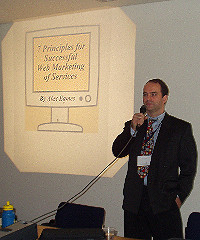| Pages in topic: [1 2] > | Proofreading - how to do it effectively for clients and selves? 投稿者: Monika Coulson
|
|---|
Monika Coulson 
Local time: 06:52
2001に入会
英語 から アルバニア語
+ ...
SITE LOCALIZER
Frequently we find that a translation that we have been given to proofread has many errors and as well it has many optional type of changes. When we proofread, how do we proofread it in a way that is best for our client and as an efficient use of our time?
_________________
| | | | Telesforo Fernandez (X)
Local time: 18:22
英語 から スペイン語
+ ...
| It is probably done by an incompetent translator at low rates. | Nov 23, 2001 |
You should proof- read in the correct manner and not in the manner convenient to you, as you said
| | | | Monika Coulson 
Local time: 06:52
2001に入会
英語 から アルバニア語
+ ...
TOPIC STARTER SITE LOCALIZER | I do not think you understood my questions Telesforo Fernandez | Nov 23, 2001 |
In my question, I did not mention any convenient manners at all. I asked what would be an efficient use of our time, meaning, do you start translating it allover again, or do you just do the traditional proofreading? Sometimes, for me it is easier to start the translation from the beginning, rather than change the many errors of the translation.
[addsig]
| | | | Telesforo Fernandez (X)
Local time: 18:22
英語 から スペイン語
+ ...
| You may have to translate it | Nov 23, 2001 |
Normally, if the translation is OK to a large extent, then you can follow the traditional method of proof -reading.
But, if the translation has glaring defects one should be carefull and translate it mentally all over again and correct it.
Sometimes machine translations can be very treacherous, in the sense that they can catch you napping. If the original translator has used machine trasnlation your task will be very difficult.
| | |
|
|
|
| Re-translating not efficient use of time | Nov 23, 2001 |
Monika, if you are concerned about making the most efficient use of your time, re-translating the document is probably not the best way.
I think it is very important to find out first what your client wants from you. There is a difference between proofreading and editing, but many people do not make this distinction. Some clients may only want someone to proofread the document to make sure nothing has been missed or that there are no spelling errors/typos.
<... See more Monika, if you are concerned about making the most efficient use of your time, re-translating the document is probably not the best way.
I think it is very important to find out first what your client wants from you. There is a difference between proofreading and editing, but many people do not make this distinction. Some clients may only want someone to proofread the document to make sure nothing has been missed or that there are no spelling errors/typos.
I was once given a translation done into English to proofread that was done by a native french translator. My boss wanted a native English speaker to look at it. I spent almost an entire day with the document, reworking awkward sentences and making it sound more \"English\" only to have my boss tell me not to make the majority of changes because they were \"choice or words\" or style changes that he didn\'t deem necessary. This seemed ludicrous to me, since what\'s the point of having a native speaker proofread if you don\'t want changes made to make it better and NOT read like a translation , but an original? I was annoyed to have wasted all that time.
Now, when asked to proofread something, I ask for specific clarification as to the extent of proofreading/editing they want done.
If you feel it\'s easier to re-translate than re-work the existing material, don\'t you think you should let the client know and then charge translation instead of proofing rates? This only seems fair and maybe this way we can teach clients that it is better to get a good translator the first time rather than a cheap one and avoid costly errors. In Spanish we have a saying, \"Lo barato sale caro\", which means basically that cheap stuff ends up being expensive. ▲ Collapse
| | | | Monika Coulson 
Local time: 06:52
2001に入会
英語 から アルバニア語
+ ...
TOPIC STARTER SITE LOCALIZER | "Gjëja e lirë kushton më shtrenjtë" (ALBANIAN: Cheap things cost more) | Nov 23, 2001 |
I agree Laura, we have almost the same expression in Albanian, (which I quoted above). Right now I am proofreading a horrable translation and when I mention this to the translation company, they said that they knew it, but their client (an attorney) did not want this to be re-translated. I was told to put only a certain number of hours on this proofreading, and if I still didn\'t finish editing, stop it anyway. I just feel like retranslating it from the beginning, even though I will not get paid... See more I agree Laura, we have almost the same expression in Albanian, (which I quoted above). Right now I am proofreading a horrable translation and when I mention this to the translation company, they said that they knew it, but their client (an attorney) did not want this to be re-translated. I was told to put only a certain number of hours on this proofreading, and if I still didn\'t finish editing, stop it anyway. I just feel like retranslating it from the beginning, even though I will not get paid for this extra job. But at the same time, I have other projects on hands and my time is very precious. Maybe if I only edit it for the amount of time I am supposed to, the client (attorney) will probable realize the difference between a good translation and a poor (and perhaps cheep) translation.
[addsig] ▲ Collapse
| | | | Werner George Patels, M.A., C.Tran.(ATIO) (X)
Local time: 08:52
ドイツ語 から 英語
+ ...
| The old miser always pays twice | Nov 23, 2001 |
That\'s the English saying.
I agree: before starting to re-translate the text, check with your client. Otherwise, you will waste a lot of time and energy and get paid for proofreading only!
If you find, in your professional opinion, that the translation needs to be re-done, tell the client. If they refuse, reject the assignment. After all, why should you engage in an exercise in futility?
[ This Message was edited by: on 2001-11-23 1... See more That\'s the English saying.
I agree: before starting to re-translate the text, check with your client. Otherwise, you will waste a lot of time and energy and get paid for proofreading only!
If you find, in your professional opinion, that the translation needs to be re-done, tell the client. If they refuse, reject the assignment. After all, why should you engage in an exercise in futility?
[ This Message was edited by: on 2001-11-23 11:16 ] ▲ Collapse
| | | | Jon Zuber (X)
スペイン語 から 英語
+ ...
| This kind of job is cutting your own throat. | Nov 23, 2001 |
If you clean up other people\'s translations for them, they\'ll continue to get the translation work while you get proofreading. I proofread other people\'s translations only when it\'s like any other proofing job, i.e., when all I have to check is what\'s in the target text, without reference to the source. Otherwise, as Laura says, it\'s not worth it, even leaving out of account the reason I cite above. The only exception is when I know I can mark up a page with lots of red ink, show it to my ... See more If you clean up other people\'s translations for them, they\'ll continue to get the translation work while you get proofreading. I proofread other people\'s translations only when it\'s like any other proofing job, i.e., when all I have to check is what\'s in the target text, without reference to the source. Otherwise, as Laura says, it\'s not worth it, even leaving out of account the reason I cite above. The only exception is when I know I can mark up a page with lots of red ink, show it to my contact person, and have him or her give me the whole job to do over. ▲ Collapse
| | |
|
|
|
| wrong perception of what proofreading & editing is all about | Nov 29, 2001 |
I have the impression that the term \'proofreading\' is being misused here.
Check the following by Judyth Mermelstein- it wraps it up in a nice and eloquent way.
Proofreaders compare the proofs of a typeset work against the text the
editor has marked up (see below), check for typesetting errors (including
things like bad kerning, wrong fonts, and errors introduced while
correcting previous errors), and may also colour-code ... See more I have the impression that the term \'proofreading\' is being misused here.
Check the following by Judyth Mermelstein- it wraps it up in a nice and eloquent way.
Proofreaders compare the proofs of a typeset work against the text the
editor has marked up (see below), check for typesetting errors (including
things like bad kerning, wrong fonts, and errors introduced while
correcting previous errors), and may also colour-code author\'s alterations
which the author will be billed for, as opposed to staff mistakes which the
publisher pays for. Proofreaders are *not* supposed to do copy editing --
in fact, they are usually trained not to read the copy for sense but to
concentrate on word-for-word and letter-for-letter matches between the
marked-up copy and the proof. One old trick to prevent oneself from being
distracted by the content is to start at the end and check each line from
right to left (European languages - I presume the reverse for Hebrew or
Arabic).
The skills required of proofreaders are primarily a sound knowledge of the
appropriate symbols for markup, an ability to focus narrowly on the visual
aspect (font recognition, spotting typos and wrong-sized bullets, etc.),
and the patience to work very meticulously. Given those skills, it is not
necessary even to understand the language of the text: in my youth I even
proofed a little Sanskrit and quite a lot of mathematics I couldn\'t
understand!
Editors, of course, have a very different sort of job. They need a
superlative set of language skills in their own language but don\'t
necessarily know any other languages well. They also need to know a lot
more about the subject of the text, who will be reading it, what type of
vocabulary is appropriate for the style, what the normal conventions are
for that type of publication and that particular publisher, etc., etc.
There are usually several editors involved in any given book, each doing a
specific type of work -- the acquisitions editor chooses the book for the
publisher, the managing editor co-ordinates its publication with the
business side (budgeting, sales, etc.), the (project) editor may be
involved in structural and substantive editing to improve the work and its
chances on the market, the copy editor will deal primarily with issues of
style and correct usage, another copy editor or \"line editor\" may go
through the manuscript again to catch any grammatical and spelling mistakes
and (one hopes!) spot any lapses of logic or inaccurate facts that slipped
by ... and only after all this does it go for layout and typesetting. It is
assumed (usually rightly) that most problems will have been corrected
before the proofreader sees the proof.
The pay rates for editors and proofreaders vary considerably, which makes
sense when you consider the different levels of responsibility and skill,
especially when there is also a requirement for real training and expertise
in a particular field. Proofreaders are generally at the low end of the
scale and are often really editors-in-training learning the business. At
the high end would be an editor in a field like neuroscience or nuclear
propulsion, who has probably had a university education in that particular
subject area and has proven his/her writing and editing skills for many
years. As a very rough idea, proofreaders in Quebec are usually in the
$15-$20/hour range, while the chief editor of a scientific journal might
well command $100-$150/hour. Most experienced but not highly specialized
Canadian editors would be somewhere in the $35-$85/hour range, depending on
their clientele and negotiating skills. If you want to know more about what
editors do, try http://www.editors.ca and have a look at \"Professional
Editorial Standards\".
In the world of translation --as in most of the non-editing world-- there
seems to be a very different notion of what is involved. Those of you who
read Alex Eames\' Tranfree newsletter may have seen an article a while back
which suggested that translators could get away with a lot less editing of
their work and actually recommended a \"proofreading\" which consists of a
simple spot-check before sending the text off to the client. Needless to
say, I disagreed with the author\'s method and misuse of the terms and took
the time to write and ask for a clarification. I received the reply that
the article was following the norms for translators.
Heaven help the profession if that is true! If we routinely sent off
unedited, unproofread files to our clients, we would certainly have little
basis for our claim to be professionals. Admittedly, our clients often
demand we meet unrealistic deadlines, which makes a careful edit
impossible, but surely a quick run with the spellchecker is *not* enough.
Some clients don\'t understand the need for time to go over our work at
least once or twice before the results are error-free and would hesitate to
pay extra for editing and proofreading time. I can understand that but not
a translator who thinks a \"more or less\" translation is good enough.
Personally, I think one\'s basic translation rate must surely include that
work or one is necessarily providing a translation which will contain
errors.
I also think the rationale for an agency taking 30% or more rather than a
basic 10%-15% commission is that the agency\'s personnel review and share
responsibility for one\'s work. An agency which does not read over the
material before submitting it to the client and which moreover makes the
translator financially liable for the dissatisfaction of a client with whom
the translator has no contact should be paying top rates to reflect the
translator\'s responsibility for proper editing.
The one agency with which I work does recheck my work thoroughly --
essential since their main client always expects a full week\'s work done
between Friday afternoon and Monday morning, and I\'m too cross-eyed by the
end not to miss things -- and gets a bit of a discount to reflect that I\'m
not spending time on a full edit. On the other hand, where the original
text is unedited and I am expected to produce a translation that makes
sense or where I am expected to do something which is not translation
(e.g., checking or revising facts or references), I do estimate the
additional editing time required and the hourly rate which will apply.
In any case, I\'m stuffy enough to say flat-out that *every* written
document other than a note to oneself probably deserves a re-reading and a
correction or two -- in short, at least a light edit. I will flex enough to
accept that \"proofreading\" in most of the world simply means re-reading a
text to eliminate spelling and grammatical errors but, old fogey that I am,
I insist that means human intervention rather than relying on software to
know what an author is trying to say.
▲ Collapse
| | | | Alison kennedy (X)
Local time: 14:52
イタリア語 から 英語
+ ...
| Proof-reading vs rechecking vs revision vs re-translation | Dec 11, 2001 |
I would agree on the definition supplied for proof-reading. This is a technical skill and should be remunerated as such by an Agency or client. It is up to the Agency to define a contract with the client that the job requires translation and any eventual checking or revision (if not standard agency practice); if it then needs to be proof-read because it is going into print or being aired in someway then this needs to be contractually specified. All too often, Agencies who are \"bending over back... See more I would agree on the definition supplied for proof-reading. This is a technical skill and should be remunerated as such by an Agency or client. It is up to the Agency to define a contract with the client that the job requires translation and any eventual checking or revision (if not standard agency practice); if it then needs to be proof-read because it is going into print or being aired in someway then this needs to be contractually specified. All too often, Agencies who are \"bending over backwards\" to please their clients, throw in the odd skill or two. This, in my mind is bad practice.
Revision or checking is a nasty area. I only work for Agencies and not direct with clients and have put a clause in my contracts with them stating what is checking, revision and what is rewriting or re-translation. This is after I\'d burned my fingers a few times! This is acceptable to most professional Agencies and I think that it demonstrates a superior skill-set. If an agency asks me to revise documents, it proves that in their opinion (or the opinion of their clients) that I translate to an above average professional standard in certain fields. Rates should be established for rechecking or revision or for re-translating a document.
Likewise, an agency that divides a large job between several translators but asks one of them to \"revise and check\" the entire document should be remunerated for this specific task.
The problems arise when you get a job that initially looks like a simple \"check and revise\" but actually needs to be re-written. I had a job recently like this for UNICEF- the original translation (which I first revised)had a few errors and was stylistically not too hot but my task was to revise (the Agency gave me 25 minutes!!) and not to rewrite. The client sent the translation back as unacceptable mainly because it wasn\'t written in \"UNICEF\" style language. I ended up re-translating the document and was paid for doing so.
In the real world, time for revision and eventual re-translation is underplanned and underestimated both by translators and agencies. Deadlines generally condition all involved. Just to read an annual report of 240 pages takes a couple of hours without starting to revise anything. Editorial pieces and art or literary texts can take much longer. Agencies always tend to underestimate and under-pay this part of translation work, which is really important for them and is the real added-value and unique-selling-point respect to a less professional agency. ▲ Collapse
| | | | DR. RICHARD BAVRY (X)
スペイン語 から 英語
+ ...
| The Ideal vs. the Real | Dec 27, 2001 |
Despite what Eveert has expounded, more often than not what is involved is a third-rate (and I am being kind) translation that would not pass muster in an \"educated\" kindergarten in the target language, let alone be acceptable to the \"end clients\". I agree entirely with Werner. Why waste your good time on attempting to \"doctor\" up a botched job that began with the outsourcers foolishness and cost-cutting measures?
I no longer accept the masquerade of \"editing\" and/or... See more Despite what Eveert has expounded, more often than not what is involved is a third-rate (and I am being kind) translation that would not pass muster in an \"educated\" kindergarten in the target language, let alone be acceptable to the \"end clients\". I agree entirely with Werner. Why waste your good time on attempting to \"doctor\" up a botched job that began with the outsourcers foolishness and cost-cutting measures?
I no longer accept the masquerade of \"editing\" and/or \"proofreading\"...it is, and always has been, a facade for incompetence!
Hey! Figure it out: get the cheapest bidder for the project, then tear your hair out to find someone who can put Humpty Dumpty together again!
Not all the King\'s horses nor all the King\'s men!
Rich ▲ Collapse
| | | | | Judyth has misunderstood and misrepresented my reply | Jun 3, 2002 |
Evert Wrote (quoting Judyth Mermelstein)
>
Judyth did indeed take the time to write me a very long email. My reply was as follows...
| | |
|
|
|
| A sample review can help to decide... | Jun 4, 2002 |
I believe that if you start the revision process by a sample of the initial, mid or final parts you can decide if the translation will have to be redone or not.
Some companies, for example, would use the sample criteria to accept ou reject a translation from its suplliers.
| | | | PAS 
Local time: 14:52
ポーランド語 から 英語
+ ...
| proof-reading and editing | Jun 10, 2002 |
There are some very good points in the posts, but I think they are getting away from the issue at hand.
No matter what it is you are asked to do, you have to agree with your client (if you can) as to the extent of the work to be done in the time span you are given.
This is what happened to me just recently. The end version of the document is to be a \"final draft\". I told the client that there are some places in the text which should, in effect, be rewr... See more There are some very good points in the posts, but I think they are getting away from the issue at hand.
No matter what it is you are asked to do, you have to agree with your client (if you can) as to the extent of the work to be done in the time span you are given.
This is what happened to me just recently. The end version of the document is to be a \"final draft\". I told the client that there are some places in the text which should, in effect, be rewritten (the document is not a translation into English, but a text written by non-natives).
He told me: \"fix all typos, spelling and obvious/glaring grammar and style errors. Otherwise, if the text is \'readable\' and \'understandable\', leave it\".
I have one week to \"fix\" ca. 200 pages of text and will work according to the guidelines which we both agreed to.
It is a matter of discipline and tolerance to leave be text which is reasonably well-written, but which you would have written differently just because your writing style is different.
Good luck,
Pawel Skalinski ▲ Collapse
| | | | | Send three sample blunders | Jun 19, 2002 |
My sympathy to you. I try to be hard on the text for the reader\'s sake and soft on the author/translator, as the saying goes. To ease my sense of frustration without taking too much extra time in these extreme cases, I have sometimes done a back-translation of the worst sentences and supplied an alternative. This would be three sentences in ten pages, for example. Others do this, of course, but I didn\'t see it mentioned. Sometimes the back-translation has the desired \"eye-opening\" effect.... See more My sympathy to you. I try to be hard on the text for the reader\'s sake and soft on the author/translator, as the saying goes. To ease my sense of frustration without taking too much extra time in these extreme cases, I have sometimes done a back-translation of the worst sentences and supplied an alternative. This would be three sentences in ten pages, for example. Others do this, of course, but I didn\'t see it mentioned. Sometimes the back-translation has the desired \"eye-opening\" effect.
As others have said, it is not efficient to proofread or revise texts that are below a certain standard.
Some questions I\'ve found helpful to ask when deciding whether to exercise \"discipline and tolerance\" or go back to the author/translator for a revision or decline the job as gracefully as possible are
Who is the readership and what is the purpose of the text (what should the reader do or think on completion of the text)?
How well do the strategy, structure, and style of the text reflect an analysis of the readers and support the intention, as far as you can judge?
These 3 \"S\" were developed at UCLA, I believe. The \"strategy\" refers to devices that bridge the gulf between writer and reader, e.g., moving from the known to the new and creating an imaginary series of questions and answers to pull the reader into the text and help the ideas get off the page and into the reader\'s mind.
Good luck
Terry ▲ Collapse
| | | | | Pages in topic: [1 2] > | To report site rules violations or get help, contact a site moderator: You can also contact site staff by submitting a support request » Proofreading - how to do it effectively for clients and selves? | Trados Business Manager Lite | Create customer quotes and invoices from within Trados Studio
Trados Business Manager Lite helps to simplify and speed up some of the daily tasks, such as invoicing and reporting, associated with running your freelance translation business.
More info » |
| | Protemos translation business management system | Create your account in minutes, and start working! 3-month trial for agencies, and free for freelancers!
The system lets you keep client/vendor database, with contacts and rates, manage projects and assign jobs to vendors, issue invoices, track payments, store and manage project files, generate business reports on turnover profit per client/manager etc.
More info » |
|
| | | | X Sign in to your ProZ.com account... | | | | | |












